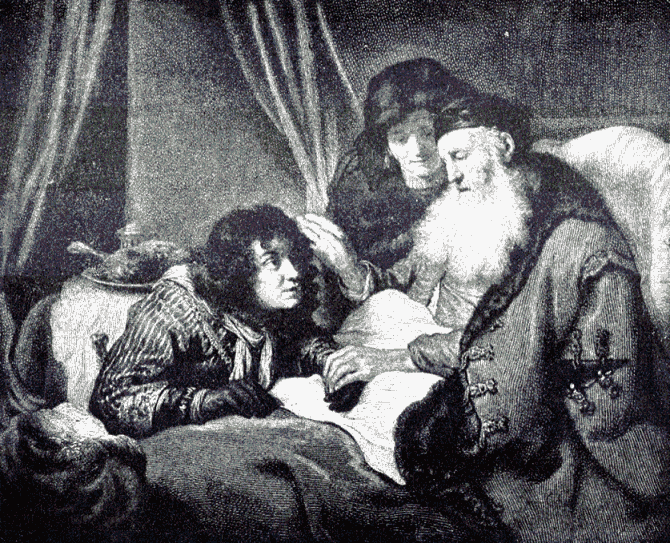Story of the Chosen People - Helene Guerber |
Jacob's Ladder
Isaac was more than one hundred years old, and was nearly blind, when he made up his mind to give his solemn blessing to his heir. This ceremony would make known to all men that this was the son chosen to continue the race which was in time to give birth to the Redeemer.
Isaac intended to give his blessing to Esau, and bade him prepare a venison feast for the occasion. While Esau was away hunting, Rebecca made up her mind to secure the birthright for her favorite Jacob; for she knew that her eldest son had given it up of his own free will.
 ISAAC BLESSING JACOB |
As she did not dare claim it openly, she tried a fraud. Jacobís smooth hands and arms were covered with hairy goat skin, so that they would seem like his brotherís to the touch, and a savory stew was prepared. Isaac, believing that it was Esau whom he touched, then gave to Jacob his solemn blessing before Esau came home from the chase.
Esau, upon entering the tent, found out what had been done, and realized then for the first time how great was his loss. Falling at his fatherís feet, he cried wildly, "Bless me, even me also, O my father!"
But it was too late. The solemn blessing, once given, could not be recalled. Isaac could not give back to Esau the first place, forfeited by weakness; nor could he make Esau the ancestor of the Messiah. Nevertheless, the father blessed his elder son also, and promised him much worldly prosperity to take the place of the greater blessing which he had lost forever.
Now, although it was all his own fault, Esau could not forgive Jacob for taking his place; and he secretly made up his mind to kill his brother as soon as Isaac had passed away. Rebecca found out these evil intentions; and, to prevent any harm to Jacob, she sent him to visit her brother Laban in Mesopotamia, under the pretext of finding a wife among the daughters of his own race.
Esau was very angry when he heard that Jacob was out of reach, and about to marry in a way that would please his father so greatly. To win back his fatherís favor, Esau sent away his heathen wives, and married a daughter of Ishmael; but he did not give up all hopes of killing Jacob, and getting back his inheritance.
Jacob, in the meanwhile, had journeyed on; and when night overtook him he lay down upon the hard ground, with a stone for a pillow. While he was slumbering thus, he had a marvelous dream, and fancied that he saw a great ladder leading from earth to heaven.
On this ladder were "the angels of God ascending and descending," and "the Lord stood above it and said: 'I am the Lord God of Abraham thy father, and the God of Isaac.'" Then God promised that he would give the land to Jacobís descendants, and would be with him and take care of him wherever he went.
When Jacob awoke, he piled up in the form of a rude altar the stones near where he lay. Then he poured oil upon them to consecrate them, and called the spot Bethel (the house of God), before he continued his journey.
Jacob was about seventy years old when he came to Mesopotamia, and sat down near the self-same well where Eliezer had found his mother, Rebecca. Here Jacob first saw Rachel, Labanís daughter, who invited him into her fatherís house, where he tarried for a month as a guest.
During this month, Jacob daily saw Rachel, and learned to love her very dearly; and he soon entered into an agreement with Laban whereby he would obtain her hand in marriage at the end of seven years, in exchange for his faithful services as shepherd.
Such was the love which Jacob felt for Rachel that these seven years of servitude "seemed unto him but a few days." As soon as they were ended, however, he went to seek Laban, and eagerly claimed his bride.
Laban prepared for the wedding, but, instead of giving up Rachel, he married Jacob to his eldest daughter, Leah. The bride was so closely veiled during the ceremony that Jacob did not find out the fraud until it was too late. He was very angry indeed at this deception, and refused to be pacified until Laban promised to give him Rachel also; but this was on condition that Jacob should continue to serve his father-in-law for another term of seven years.
As in those days it was quite customary to have several wives at once, Jacob consented, and soon married Rachel. Then, at the request of Rachel and Leah, he also married their handmaidens. During the seven years which followed, Leah and the two servants gave birth to ten sons,óReuben, Simeon, Levi, Judah, Issachar, Zebulun, Dan, Naphtali, Gad, and Asher. Leah also had a daughter named Dinah; but Rachel, Jacobís favorite wife, had no children at all.